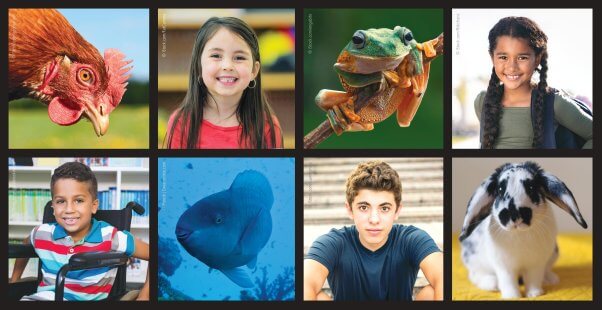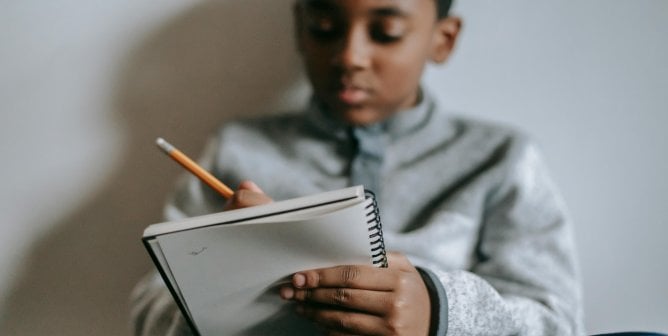Writing Prompts That Inspire Elementary Students to Write and to Empathize with Animals
We’re all animals, and although you may see some confused stares from your students when you tell them this, they’ll be interested to learn that we have more in common with other animals than they might think. These writing prompts for elementary schoolers have been designed specifically to help you navigate conversations on this topic with your students and inspire them with something to write about. We bet they won’t want to put their pencils down! As a bonus, these prompts will help students build empathy for all the fellow animals we share the world with.

You can use these writing prompts as a warm-up activity to get the day started or any time you’re looking to get your students thinking about the ways humans and other animals are the same. When students are inspired by a writing topic, they produce higher-quality written work and have more fun doing so. The more we learn about animals, the more we can see ourselves in these sentient beings—and encouraging kids to relate to them helps cultivate compassionate hearts in which empathy for animals can grow and flourish as students sharpen their writing skills. Now that’s what we call “feeding two birds with one scone.”
Grades K–2 Writing Prompts
1. We all deserve kindness. All animals, big and small, deserve kindness. Write about a time someone was kind to you. What did they do? How did that make you feel?

2. We all want to be loved. Animals, just like humans, want to be loved. How do you show love to animals?

3. We are all beautiful. Each animal is beautiful in their own way. What is your favorite animal? What makes them beautiful?

4. We have favorite activities. Dogs love to go for walks with their human friends. What is something you love to do?

5. We love being with our families. Rats love snuggling with their families. What is your favorite thing to do with your family?

6. We are compassionate. Being compassionate means caring about others and showing them kindness. How are you compassionate to animals?

7. We love spring. Spring is a season for new life. Flowers bloom and baby animals are born. What is your favorite thing about spring?

8. We love the sea. Many animals live in the sea. Which type of sea animal is your favorite? Why?

9. We need warmth. Some animals have fur that keeps them warm, and we shouldn’t take it from them. What is your favorite way to stay warm?

10. We love to play. Cats love to play with their human friends. What is your favorite game or toy to play with? Do you like playing alone or with friends? Why?

11. There are things we don’t like. Birds don’t like to be chased because it scares them. What’s something you don’t like? Why don’t you like it?

12. We have friends. Fish have friends, just like you. Who is your best friend? Why did you pick them as your best friend?

13. There are things we like to do. Pigs like to play outside in the mud because mud keeps them cool. What is something you like to do? Why do you enjoy it?

14. We show each other affection. Pigeons care about their families, just as we care about ours. How do you show affection to your loved ones?

15. We are all connected. Animals and humans are more alike than different. How does this make you feel connected to animals?

16. We dream of a peaceful world. Animals want to live in peace, just like us. How would you make the world more peaceful for animals?

17. We have feelings. Fish and other animals have feelings, just like us. How do you feel right now? Why?

18. We want to live. Animals want to live, just like us. What is your favorite thing about being alive?

19. We feel happiness. Animals feel happy when they are with their friends. Write about something that makes you happy.

20. We have favorite snacks. Turtles love to snack on vegetables. What is your favorite snack? Why?

21. We love to be in nature. Snakes love to be in nature where they belong. Write about your favorite thing to do in nature.

22. Sometimes we’re sad. Orcas are sad when they’re kept in tanks. What is something that makes you sad? Why does it make you feel this way?

23. We like to go home. Animals don’t want to live in a classroom. How would you feel if you had to live in your classroom and could never go home? Why?

24. We are curious. Chickens and other animals are curious about the world around them. What are you curious about?

25. We love to sleep. Animals love to sleep in comfortable places. What is your bedroom like? What makes it comfortable?

26. We are awesome! Each animal has something that makes them awesome. Who is your favorite animal? What makes them awesome? What makes you awesome?

27. We have special talents. Owls can turn their heads almost in a full circle. Write about a special talent you have.

28. There are books about us. There are many books about animals, and some of them are about animals who have human friends. What’s your favorite book that has an animal in it? Why is it your favorite?

29. There are movies about us. Many movies are about humans, but some are about animals. What is your favorite movie about animals? What happens in it?

30. We are brave. Spiders must be brave when humans catch them indoors in order to carry them back outside. Write about a time when you had to be brave.
Grades 3-5 Writing Prompts
1. We want to be free. Betta fish are often kept in tiny tanks, cups, or bowls, but they would rather be free to live in their natural homes. Reflect on a time when you had to go somewhere you didn’t want to be. Where were you, and how did you feel when you finally got to leave? How might your feelings have been similar to those of an animal freed from confinement?

2. We don’t deserve to be called names. Sometimes people call pigeons “pests” because they flock together in large numbers. But did you know they do that to stay safe? We shouldn’t call them names just because we don’t understand their behavior. Reflect on a time when someone tried to be mean to you or someone else by calling you or them a name that wasn’t nice. How could you have responded in a kind way? After all, being mean back to a name-caller isn’t nice, either.

3. We care about our lives. Even the tiniest animals care about their lives and want to live in peace. They don’t want to be squashed, chased, or swatted at. Imagine you’re a spider or other small insect. You accidentally wander into a building, and a human finds you. What do you hope they do? Why do you hope that?

4. We deserve safety and comfort. Companion animals deserve to be treated like family members, which means keeping them indoors where they’re safe and protected from hot and cold weather. How would you feel if your family made you sleep outside? Describe how a dog or cat would feel if they were forced to sleep outside.

5. We’re all living, feeling beings. All animals, including humans, are living beings with wants, needs, likes, and dislikes. Describe a way humans and other animals are alike. What do we have in common? What things might a human like that other animals wouldn’t like? What things might other animals like that humans wouldn’t like?

6. We all feel pain. When fish are pulled out of the water by hooks in their mouths, they feel pain. Why do you think some people are OK with putting hooks in fish’s mouths but wouldn’t be OK with putting hooks in dogs’ or cats’ mouths?

7. We want to be included. Dogs are part of the family and want to be indoors with the people they love. Making them stay outside all the time is unkind. Think about a time when you weren’t included. How did it make you feel? If you see someone being left out, what can you do?

8. We remember things. Chickens love being with their friends. They remember their faces and can also remember human faces—lots of them! Write about a time when you needed to remember something. What was it, and why was it important to remember?

9. We are all someone. Every animal on Earth, including each of us, is unique and unlike anyone else. Explain why we should call other animals “someone” instead of “something.” Pick an animal and describe what makes them unique. What makes you unique?

10. We all deserve freedom. When animals are kept in tanks or cages, they become extremely frustrated and sad. They miss out on all the things they love to do in their natural habitats. Imagine never being allowed to leave your bedroom. How would you feel, and what would you miss doing?

11. We don’t want to be hurt. All animals, including fish, can feel pain. Just as you don’t want anyone to hurt you, fish and other animals don’t want to be hurt, either. Imagine you are a fish. What would you say to someone fishing in the body of water you live in? What other activities would you suggest they do instead, and why?

12. We want to have a loving home. There are around 70 million companion animals in the U.S. who don’t have homes. Every time someone buys a dog or another animal from a breeder or a pet store, an animal in a shelter loses a chance to be adopted. Think about your home and your family. What are three things about them that you’re most grateful for? What are three things an animal might be grateful for in their home?

13. We are the same in the ways that matter most. Even though humans look different from other animals, we have a lot in common with them. We all have hearts that beat to keep us alive, and we all feel emotions. Which animal do you feel you have the most in common with? Explain why.

14. We dream. Other animals have dreams when they sleep, just like us. After looking at this image, describe what you think the bird is dreaming about. Why does the bird say, “I wish I could dream forever”? What do you think you would dream about if you were kept in a cage?

15. We form bonds with our friends. Chickens are sensitive, social animals who love spending time with their flock and even enjoy forming special connections with humans. Write about an activity you like to do with your family or friends. How does the activity help you bond with them?

16. We want to feel safe in our homes. Animals who live in nature don’t have houses with doors that can be locked like ours. Anyone can enter their homes at any time, which means they must always be on alert. What are some things we can do (or not do) that would help animals feel safe in their homes?

17. Litter is bad for us. Litter damages the environment, and it can hurt animals if they eat it or become tangled in it. Write about three things you can do to keep trash from hurting animals.

18. We don’t want to be forgotten. Dogs want to be loved by their human families and included in activities with them. It makes them sad when they’re left out and forgotten. Reflect on a time when you felt forgotten. What happened, and how did it make you feel? What are some ways to help others feel loved instead of forgotten?

19. We get tired. Animals get tired when they’re forced to work. If you ever see horses pulling carriages, imagine how they must feel. Think about a time when you got tired. What were you doing? Were you able to take a break or stop altogether? How would you have felt if someone had told you that you had to keep going and couldn’t stop?
20. We take care of ourselves. Mice and rats keep clean by grooming themselves, which they do by rubbing their front paws on their faces and then licking and rubbing the rest of their bodies down to their tails. Self-care is all about taking care of yourself. Write about your favorite self-care activity. If you’re feeling down or tired, what do you do to make yourself feel better?

21. We care about our work. Bees work hard every day gathering nectar, which pollinates flowers and helps plants grow. They also make honey for their hives, and they suffer when humans take the honey for themselves. Write about something you’re working on that you’re proud of. What is it? How long have you been working on it? How much longer until you’re finished? Explain how you would feel if someone came and took it away from you because they wanted it for themselves.

22. We get scared. Some circuses use elephants who were taken from their mothers as babies and trained using pain and fear. Reflect on a time when you felt scared. What happened, and how was it resolved?

23. We are not insults. Have you ever heard someone call another person a “dirty rat” because they did something that others didn’t like? Rats are gentle, smart individuals who love snuggling, playing with their friends, and building close bonds with their human companions. And they’re exceptionally clean, too. Calling someone a rat isn’t insulting. It’s a compliment! Can you think of other animal names that are used as insults? Which ones, and how are they really compliments?

24. We love being outside in the fresh air. Animals who are used for experiments in laboratories don’t get to go outside and breathe fresh air. Imagine you had never been allowed to go outside. What’s the first thing you would want to do when going outside for the first time? How do you think you would feel? Why?

25. We’re on this planet together. Other animals are not here for us to use, just as we’re not here for anyone else to use. What are some actions you can take to share the planet with other animals?

26. We’re lucky to have kind friends. Many animals can’t defend themselves against humans, so they depend on us to be kind to them, just as we depend on others to be kind to us. Think about someone kind in your life. In what ways are they kind?

27. We are the same. Dogs are usually seen as members of the family, but pigs and many other animals are often seen as food. This point of view is called speciesism, the belief that some species are superior to others and deserve better treatment. Why do you think speciesism exists? Write about three things we have in common with other animals.

28. We are smart. Octopuses are smart and can use tools to accomplish things they want to do. They’re also experts at camouflaging their bodies to blend in with their surroundings and protect themselves from predators. Write about some smart things you can do. How are you like an octopus?

29. We want to be treated fairly. In Thailand, monkeys are taken from their homes and forced to pick coconuts. Do you think that’s fair? Write about a time when you were treated unfairly. What happened, and how did it make you feel? How could you have been treated more fairly?

30. We need help sometimes. Glue traps cause animals to get stuck in glue, and the harder they try to escape, the more stuck they get. If you ever find an animal stuck on a glue trap, tell an adult so they can help. Describe a time when you needed help. Why did you need help, and who helped you? How was the problem resolved?
Need more inspiration? Sign up for TeachKind e-mails to stay up to date with new content and promotions:








